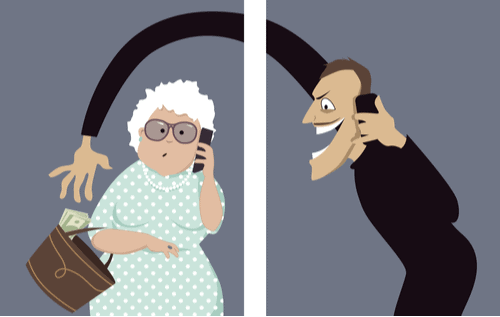Each year, millions of elderly Americans fall victim to elder fraud via some type of confidence scheme or financial fraud.
According to the FBI, scams targeting seniors are on the rise because they tend to be polite and trusting and they also usually have financial savings, own a home, and have good credit—all of which make them attractive to scammers.
“PAY NO ATTENTION TO THE MAN BEHIND THE CURTAIN” – The Wizard of Oz
So says the most famous scammer of all time. The Wizard communicates how easy it is to deceive people when they want to trust, and in 2021 nothing has changed, especially for seniors!
The FBI has reported that American seniors are being targeted online in record numbers. Last year, people aged 50 and older lost $3 billion to scams targeting seniors. But this number is on the low side because, as the FBI pointed out, many seniors are too ashamed to reveal that they have been scammed.
Five Prevalent Scams Targeting Seniors
AARP has published a list of the top scams targeting seniors in 2021. Here are some of the most common.

1. Zoom Phishing Emails
A message with the Zoom logo arrives by email, text, or social media. It tells you to click on a link because you’ve missed a meeting, or your account is suspended. Once you click, the criminals download malicious software onto your computer which gives them access to your personal information that they will use for identity theft and search for your passwords into your other accounts.
NEVER CLICK ON LINKS IN UNSOLICITED EMAILS, TEXTS, OR SOCIAL MEDIA MESSAGES. IF YOU THINK THERE IS A PROBLEM WITH YOUR ZOOM ACCOUNT, CONTACT ZOOM CUSTOMER SERVICE.
2. COVID-19 Vaccination Card Scams
This scam is directed to all the seniors who proudly posted selfies with their vaccination cards. Scammers pounced. They now have your full name and birth date – enough information to break into your bank account, credit cards in your name, and more.
USE A ‘GOT MY VACCINE PROFILE PICTURE FRAM ON SOCIAL MEDIA, SUGGESTS FLORIDA ATTORNEY GENERAL, ASHLEY MOODY.
3. Online Romance Scams
Today’s scammers are lurking within online prayer groups, book clubs, and online games like Words With Friends. They lure you onto an unmonitored site and eventually hit you up for money. NEVER, NEVER SEND MONEY TO SOMEONE YOU’VE NEVER MET IN PERSON, AND DON’T SELFIES OR VIDEOS. THESE COULD LEAD TO BLACKMAIL.
4. Medicare Card Scams
They will contact you by knocking on your door, phoning, or emailing you. They claim to be from Medicare with an offer of a new card that contains microchips.
HANG UP THE PHONE, SHUT THE DOOR, AND DELETE THE EMAIL. MEDICARE WILL NEVER CALL TO SELL YOU ANYTHING. GUARD YOUR MEDICARE NUMBER!
5. Social Security Scam Calls
You get a scary phone call saying that your Social Security number was used in a crime – and you’ll be arrested soon if you don’t send money to fix it. According to Amy Nofziger from AARP, “They may say your number was used to rent a car where drugs were found and that the Drug Enforcement Agency is on their way to your house, The caller may refer you to a local law-enforcement website where you can see the person’s picture. You think you’ve checked it out, call them back and send money.”
NEVER PICK UP THE PHONE UNLESS YOU ABSOLUTELY KNOW WHO’S CALLING. IF IT’S IMPORTANT, THEY’LL LEAVE A VOICEMAIL.”
We’re Here to Help
These are only a few of the scams targeting seniors that can be found on the AARP website.
We, at Kabb Law, care about all of you and want to protect you. If you are suspicious that someone is trying to scam you, call us at 216-991-5222 and discuss the information with us. It will help you and will give us an opportunity to help our other clients.

